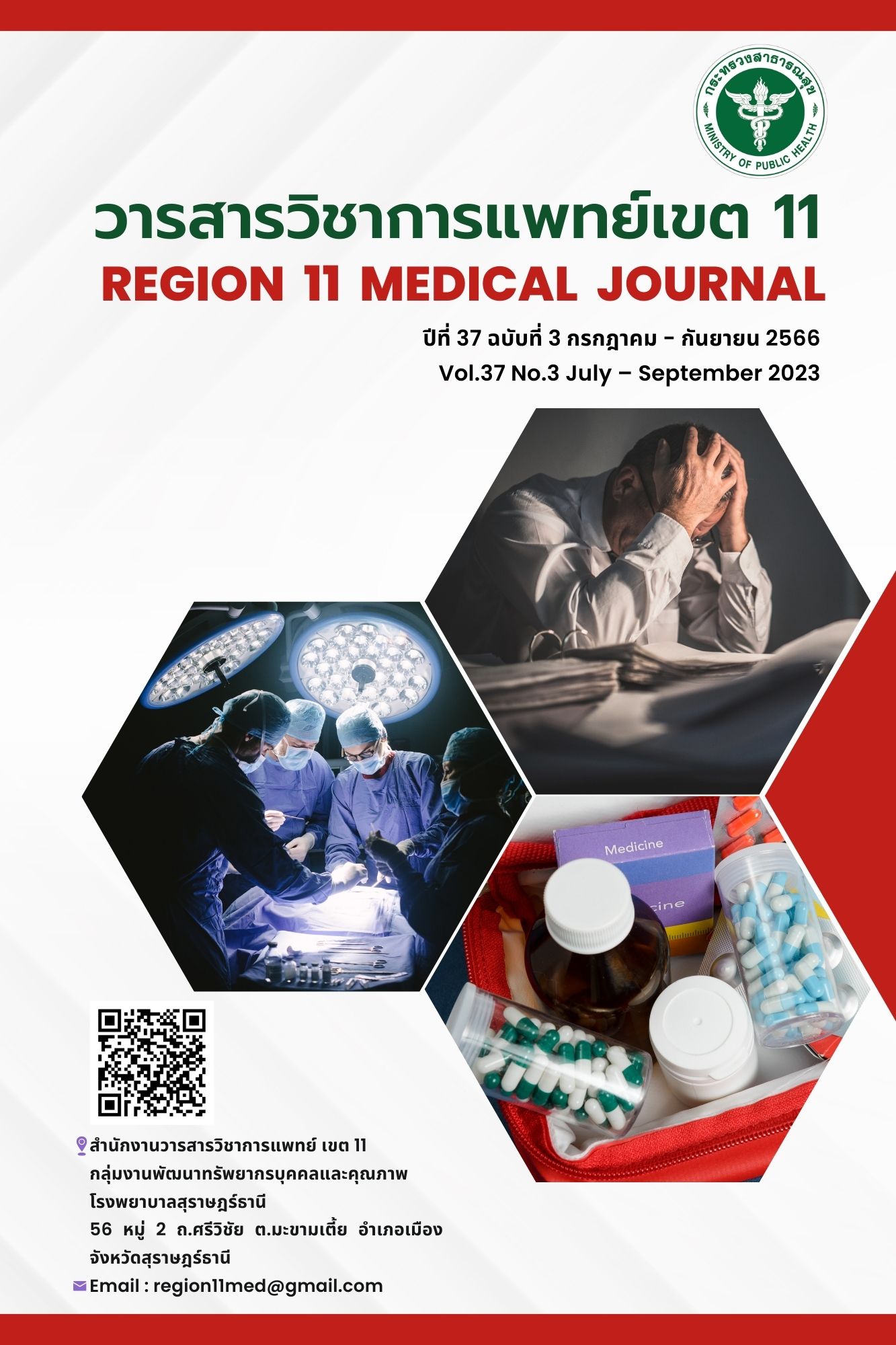ความสัมพันธ์ระหว่างปัจจัยที่เกี่ยวข้องกับผู้ป่วยกับระดับความร้ายแรงของอาการไม่พึงประสงค์จากการใช้ยา
คำสำคัญ:
ปัจจัยที่เกี่ยวข้องกับผู้ป่วย, ระดับความร้ายแรง, อาการไม่พึงประสงค์จากการใช้ยาบทคัดย่อ
ที่มา: อาการไม่พึงประสงค์จากการใช้ยา (adverse drug reactions : ADRs) เป็นอาการที่เกิดขึ้นโดยมิได้ตั้งใจและเป็นอันตรายต่อมนุษย์เมื่อใช้ยาในขนาดปกติ ความร้ายแรงของ ADRs ส่งผลให้ผู้ป่วยต้องเข้ารับการรักษาในโรงพยาบาลและเพิ่มระยะเวลาในการรักษานานขึ้น หรืออาจพิการหรือเสียชีวิตได้
วัตถุประสงค์: ศึกษาความสัมพันธ์ระหว่างปัจจัยที่เกี่ยวข้องกับผู้ป่วยกับระดับความร้ายแรงของ ADRs
วิธีการศึกษา: ศึกษาแบบย้อนหลัง วิเคราะห์ข้อมูลปัจจัยที่เกี่ยวข้องกับผู้ป่วย เช่น เพศ อายุ ประวัติการแพ้ยา/อาหาร/สารเคมี กลุ่มยาที่ทำให้เกิด ADRs โดยใช้สถิติพรรณนา ได้แก่ ความถี่ ร้อยละ และวิเคราะห์ความสัมพันธ์ระหว่างปัจจัยที่เกี่ยวข้องกับผู้ป่วยที่ศึกษากับความร้ายแรงของการเกิด ADRs ใช้สถิติไค-สแควร์
ผลการศึกษา: เป็นเพศหญิง ร้อยละ 52.50 และเพศชาย ร้อยละ 47.50 ช่วงอายุที่พบ ADRs สูงสุดคือช่วงอายุ 51-60 ปี ร้อยละ 18.20 ผู้ป่วยมีประวัติการแพ้ยา/อาหาร/สารเคมี ร้อยละ 19.90 และไม่มีประวัติ ร้อยละ 80.10 กลุ่มยาที่ทำให้เกิด ADRs มากที่สุดได้แก่ antibacterial drugs ร้อยละ 42.10 และกลุ่มยาอื่นๆ ร้อยละ 57.90 สำหรับความร้ายแรงของอาการ ADRs พบว่ามีความร้ายแรง ร้อยละ 22.50 ไม่มีความร้ายแรง ร้อยละ 77.50 ความสัมพันธ์ระหว่างอายุ กลุ่มยากับระดับความร้ายแรง ADR พบว่ามีความแตกต่างอย่างมีนัยสำคัญทางสถิติ (p=0.037 และ p<0.001 ตามลำดับ)
สรุป: ความร้ายแรงของอาการไม่พึงประสงค์จากการใช้ยามีความสัมพันธ์กับอายุของผู้ป่วยและกลุ่มยาที่ใช้
เอกสารอ้างอิง
ศูนย์เฝ้าระวังความปลอดภัยด้านผลิตภัณฑ์สุขภาพ. รายงานเหตุการณ์ไม่พึงประสงค์จากการใช้ผลิตภัณฑ์สุขภาพในมนุษย์, สืบค้นเมื่อ 4 ธันวาคม 2565. จาก https://hpvcth.fda.moph.go.th/about-us/
บงกช เพียรไทย.. ความสัมพันธ์ระหว่างปัจจัยและระดับความร้ายแรงของเหตุการณ์ไม่พึงประสงค์จากการใช้ยา โรงพยาบาลพระนารายณ์ : การศึกษาภาคตัดขวาง. วารสารสุขภาพและสิ่งแวดล้อมศึกษา, 2563 ;5(2), 135-147.
รุ่งนภา ทรงศิริพันธ์. (2561). ศึกษาปัจจัยที่มีความสัมพันธ์กับระดับความรุนแรงของอาการไม่พึงประสงค์จากการใช้ยา. วารสารเครือข่ายวิทยาลัยพยาบาลและการสาธารณสุขภาคใต้,2561; 5(2), 46-56.
ศิริกัญญา คำพิชิต, ธงชัย ประฎิภาณวัตร และนฤมล เจริญศิริพรกุล. (2561). การศึกษาความรุนแรงของการเกิดอาการไม่พึงประสงค์จากยาโดยการรายงานของผู้ป่วย. ศรีนครินทร์เวชสาร 2561; 33(2), 113-121.
Seon-Heye W, Sang-Yoen S, Eunji Y and Hong-Yup A. Risk Factors Related to Serious Adverse Drug Reactions Reported through Electronic Submission during Hospitalization in Elderly Patients. Korean J Fam Med. 2022 Mar;43(2):125-131.
Yan Z, Feng Z, Jiao Z, Chen C, Wang G, Feng D. The severity of adverse drug reactions and their influencing factors based on the ADR monitoring center of Henan Province. Sci Rep. 2021 Oct 14;11(1):20402. doi: 10.1038/s41598-021-99908-3. Erratum in: Sci Rep. 2022 Feb 8;12(1):2439. PMID: 34650181; PMCID: PMC8516964.
Alomar MJ. Factors affecting the development of adverse drug reactions (Review article). Saudi Pharm J. 2014 Apr;22(2):83-94.
Lavan AH, Gallagher P. Predicting risk of adverse drug reactions in older adults. Therapeutic Advances in Drug Safety. 2016 ;7(1):11-22.
Manoj KM, Yogananda R and Saurabh D. Risk factors associated with adverse reactions in hospitalized patients. IJPSR,; 8(9)2017: 3847-3854.
Jung IY, Kim JJ, Lee SJ, Kim J, Seong H, Jeong W and et al. Antibiotic-Related Adverse Drug Reactions at a Tertiary Care Hospital in South Korea. BioMed Res Int. 2017;2017:4304973.doi:10.1155/2017/ 4304973.Epub 2017 Dec 31.PMCID : PMC5804292.
Hall V, Wong M, Munsif M, Stevenson BR, Elliott K, Lucas M and et al. Antimicrobial anaphylaxis: the changing face of severe antimicrobial allergy. J Antimicrob Chemother. 2020 Jan 1;75(1):229-235. doi: 10.1093/jac/dkz422. PMID: 31637446.
Patterson RA and Stankewicz HA. Penicillin Allergy. [Updated 2022 Jun 23]. In: StatPearls [Internet]. Treasure Island (FL): StatPearls Publishing; 2022 Jan-. Available from: https://www.ncbi.nlm.nih.gov/books/NBK459320/
Konyoung P, Nakkam N, Khawsuk H, Khaeso K and Tassaneeyakul W. Severe Cutaneous Adverse Drug Reactions: A Study of 216 Patients from Udon Thani Hospital. Thai J Pharmacol ; 2020,42(1) : 5-19.
Kim HK, Kim DY, Bae EK and Kim DW. Adverse Skin Reactions with Antiepileptic Drugs Using Korea Adverse Event Reporting System Database, 2008–2017. J Korean Med Sci. 2020 Feb;35(4):e17. https://doi.org/10.3346/jkms.2020.35.e17
Park CS, Kang DY, Kang MG, Kim S, Ye YM, Kim SH and et al. Korean Registry of Severe Cutaneous Adverse Reactions Consortium. Severe Cutaneous Adverse Reactions to Antiepileptic Drugs: A Nationwide Registry-Based Study in Korea. Allergy Asthma Immunol Res. 2019 Sep;11(5):709-722. https://doi.org/10.4168/aair.2019.11.5.709
Chaikong T, Santimaleeworagun W and Phornprapa N. Rate of Severe Cutaneous Adverse Reactions Due to First Line Anti Tuberculosis Drugs: Health Product Vigilance Center Database; The Food and Drug Administration, Ministry of Public Health. 2019 ; 6(4) : 45-63.
Jin HJ, Kang DY, Nam YH, Ye YM, Koh YI, Hur GY and et al. Korean Severe Cutaneous Adverse Reactions Consortium (KoSCAR). Severe Cutaneous Adverse Reactions to Anti-tuberculosis Drugs in Korean Patients. Allergy Asthma Immunol Res. 2021 Mar;13(2):245-255. doi: 10.4168/aair.2021.13.2.245. PMID: 33474859; PMCID: PMC7840880.
Shin HJ, Chang JS, Kim MS, Koh BG, Park HY, Kim TO and et al. Hypersensitivity reactions to multiple anti-tuberculosis drugs. PLoS One. 2021 Feb 4;16(2):e0246291
Patrizia B, Francesco O, Jesper JN, Roberta Z, Laura M and Theo G . Non-steroidal anti-inflammatory drug-induced anaphylaxis infrequent in 388 patients with mastocytosis: A two-center retrospective cohort study. Front. Allergy, 2022 Dec. Front. Allergy 3:1071807.doi: 10.3389/falgy.2022.1071807
Aun MV , Blanca M, Garro LS, Ribeiro MR, Kalil J, Motta AA and et al. Nonsteroidal Anti-Inflammatory Drugs are Major Causes of Drug-Induced Anaphylaxis. J Allergy Clin Immunol Pract. 2014 Jul-Aug;2(4):414-20.doi: 10.1016/ j.jaip. 2014.03.014. Epub2014 May 23. PMID:25017529.
Shaikhain T A, Al-Husaynib F, Elder K . (December 20.2019). Ibuprofen-induced Anaphylactic Shock in Adult Saudi Patient. Cureus 11(12):e6425. DOI 10.7759/cureus.6425
ดาวน์โหลด
เผยแพร่แล้ว
รูปแบบการอ้างอิง
ฉบับ
ประเภทบทความ
สัญญาอนุญาต
ลิขสิทธิ์ (c) 2023 วารสารวิชาการแพทย์เขต 11

อนุญาตภายใต้เงื่อนไข Creative Commons Attribution-NonCommercial-NoDerivatives 4.0 International License.






